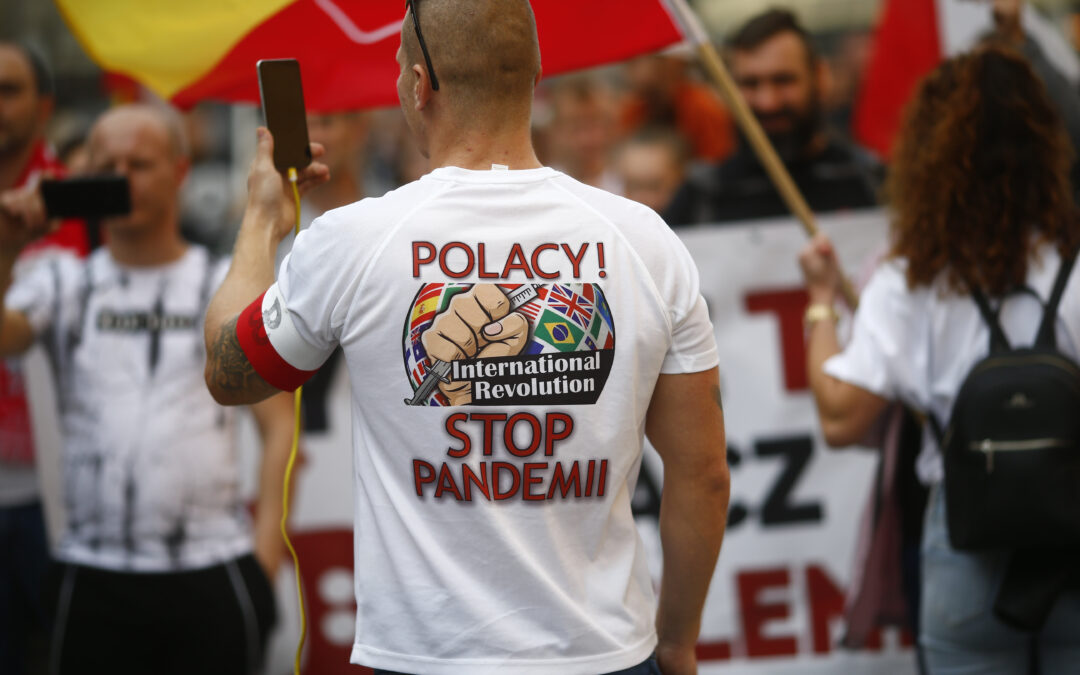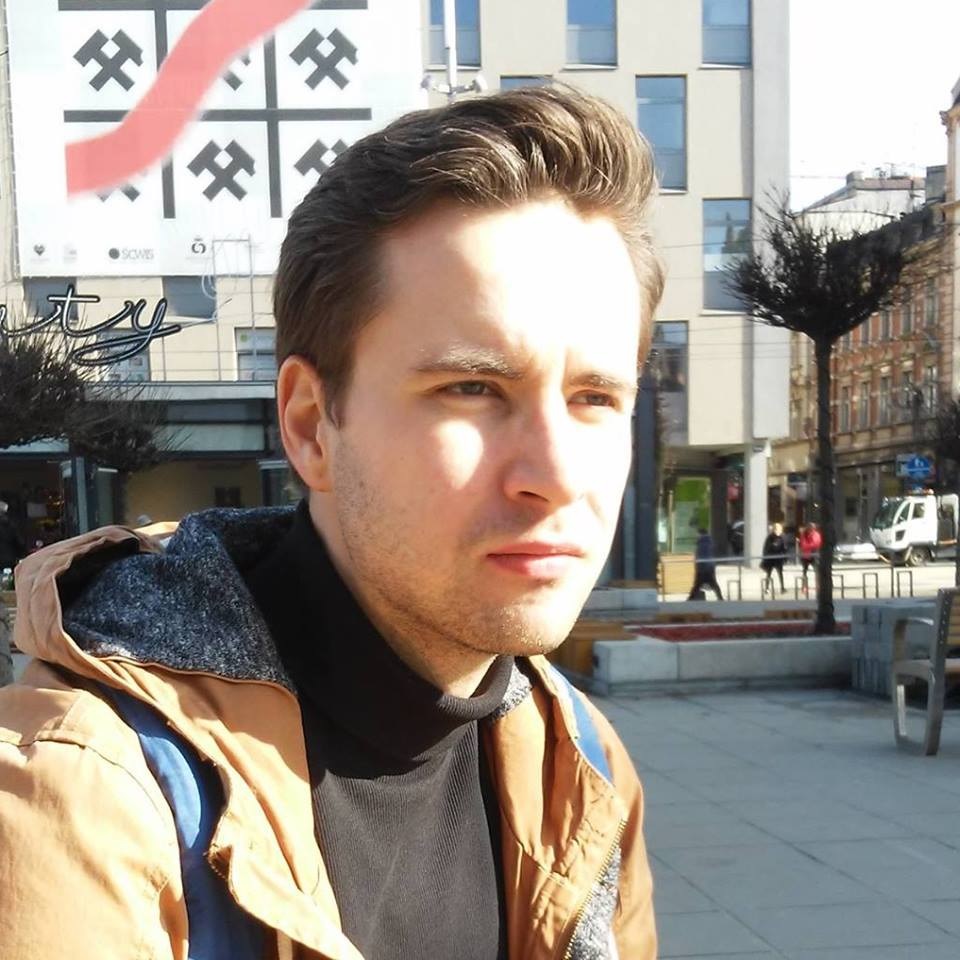By Dariusz Kałan
While Poland continues to fight with mounting COVID-19 cases and deaths, Dawid Schreiber is leading his own private battle.
“Since the beginning of this pseudo-pandemic, I have not put a mask on and will never do it,” says Schreiber, a 19-year-old budding rapper.
In early October, in his hometown Bydgoszcz, in central-northern Poland, he co-organised a “March for Freedom” that gathered together those who either do not believe the coronavirus is real or think that its scale is overblown by media and thus the restrictions imposed by the government are too harsh.
In Bydgoszcz, some 200-300 people took to the streets in a peaceful protest. But in central Warsaw a similar demonstration later that month attracted thousands and turned violent, with police deploying tear gas and using force against the crowd, including Schreiber.
“People are fed up because there is no real information, and everything is withheld, and the government is stirring up panic,” says Schreiber. According to his sources – which he did not want to reveal – coronavirus “is not dangerous and can only kill people who have weak immunity or comorbidities”.
Asked about his political views, Schreiber says that he “sympathises with the national part of Confederation”. That is the name of a far-right party formed from an alliance of paleolibertarians and nationalists. At both last year’s parliamentary election and this year’s presidential one, Confederation (Konfederacja in Polish) secured almost 7% of votes cast, with around 1.3 million votes at each.
Confederation has been a prominent supporter of anti-lockdown protests. Its MPs have refused to wear masks in parliament. Two of the party’s leaders – Janusz Korwin-Mikke and Grzegorz Braun – were speakers at the event in Warsaw attended by Schreiber, which drew a crowd of thousands, almost 300 of whom were detained after the clashes with police.
Braun has likened the compulsory wearing of masks to how the Nazis forced Jews to wear armbands as a first step on the way to ghettoisation and then death. “Masks are not the final goal,” warned Braun, but rather a way of “training” people for some other fate.
Before embarking on his current corona-crusade, Braun was well known for other conspiratorial views regarding Jews. He claims that “Jews have waged war against the Polish nation for centuries”, and want to turn Poland into a “Jewish state”.
A march claiming that coronavirus is fake and part of a conspiracy to limit people's rights took place in Warsaw today under the slogan "Stop the Plandemic".
Among the hundreds of participants was one of the leaders and MPs of the far-right Confederation https://t.co/D3i4BX8Vnj
— Notes from Poland 🇵🇱 (@notesfrompoland) August 16, 2020
At the Warsaw anti-lockdown protest, participants held signs saying “End the Plandemic” and “Covid: Fake News”. But the more libertarian sections of Confederation insist that their involvement in the protests is about protecting businesses rather than promoting conspiracy theories.
Sławomir Mentzen, a leading strategist from the party, admits that “if it weren’t for the people who don’t believe in the coronavirus, there would be no protests whatsoever”. However, he himself says that “the existence of the coronavirus should not be questioned, only the way to combat it.”
What Confederation wants to do is “to save companies from being closed. We discuss the dangers of a lockdown and imposition of new taxes, which is especially unacceptable”.
“Restrictions create a new electorate for the far right”
Confederation’s mix of free-market ideas, hard-line nationalism, anti-systemic sentiment and conspiratorial thinking embodies the strategy that many far-right groups in Central Europe have recently adopted. They have used the pandemic not only to attract those who believe in conspiracy narratives, but also to pitch themselves as protectors of personal and economic freedoms against restrictive anti-Covid measures.
According to Juraj Marušiak, a political scientist at the Slovak Academy of Sciences in Bratislava, it is “a strange paradox” that the far right, which wants to limit freedoms in many other spheres, has tried to grow as a voice of those who suffer from restrictions. Yet, Marušiak admits, this strategy may turn out to be successful due to the damage to public confidence in governments’ handling of the crisis.
“Restrictions put many people’s lives in despair, also in economic terms, and create a new electorate for the anti-systemic far right,” says Marušiak.
Central Europe avoided the worst of the first coronavirus wave in spring, but this autumn it has seen a huge surge in COVID-19 infections. Across the region, there are complaints that authorities fell into complacency, failing to use the time they had won to prepare for the second wave. Local health systems, which have long experienced problems with a lack of resources and staff, are now overwhelmed.
The current surge in infections is causing particular concerns in Central and Eastern Europe due to weak health care systems, shortages of doctors and nurses, and large elderly populations, often living in multigenerational households, notes the @nytimes https://t.co/g4G6NEvL3f
— Notes from Poland 🇵🇱 (@notesfrompoland) October 14, 2020
Another complaint is over inconsistent messaging. In Poland, the same politicians now chastising the public for not adhering to “DDM” (disinfect, distance, mask) rules have themselves often been caught ignoring their own guidelines in previous months. In July, while trying to boost election turnout among elderly voters, Prime Minister Mateusz Morawiecki declared “the virus is on its way out” and “we no longer need fear it”
Pleading now with people to follow strict lockdown rules is a “desperate move,” according to Peter Švrček, the leader of Slovenskí branci (“The Slovak Conscripts”), a Slovak far-right paramilitary organisation. “The government proposes a drug that is worse than the disease,” he said, blaming ruling the conservative coalition led by Igor Matovič for both the explosion in new cases and economic crisis that will likely follow.
In mid-October, Švrček was one of hundreds who gathered in front of the Government Office in Bratislava to protest against the COVID-19 lockdown. Just like in Warsaw, it ended with demonstrators – including football hooligans and supporters of the neo-fascist People’s Party Our Slovakia (L’SNS) – clashing with the police.
Anti-lockdown protest turns violent in Slovakia's capitalhttps://t.co/iPWex83HoY pic.twitter.com/qqksZJ8umW
— 1 NEWS (@1NewsNZ) October 18, 2020
The veteran leader of L’SNS, Marian Kotleba, has sought to appeal to struggling business owners, Covid sceptics and those suspicious of Matovič’s idea of testing the country’s entire population. When Kotleba himself tested positive for coronavirus, he claimed he was fighting it with vodka and cough medicine. His party is the fourth largest in Slovakia’s parliament.
New groups emerging
However, the growing frustration with ruling politicians has prompted new groups to emerge too.
In the neighbouring Czech Republic, which in the last week has faced the highest per capita death rate in the world, the pandemic has been exploited by the Citizen Dissatisfaction Movement (HON), a newly-established civic association. According to Tomasz Peszyński, a Czech liberal activist, HON is a “strange mixture of [prime minister] Andrej Babiš’s democratic opponents, far-right extremists and pro-Russian followers.”
In mid-October, HON organised, along with football hooligans, an anti-lockdown demonstration in Prague’s Old Town. It saw almost identical scenes of violence as those in Warsaw and Bratislava. The police deployed water cannon and arrested some 100 protesters.
🇨🇿Czech police tried to disperse protesters in Prague on Sunday after thousands, including soccer and ice hockey fans, rallied to condemn #Covid19 restrictions that include banning sports competitions and bar closures pic.twitter.com/ofZSIiiwks
— Bloomberg Quicktake (@Quicktake) October 19, 2020
Michaela Havlanová, HON’s spokesperson, admits she is concerned that acts of vandalism could distract attention from their main goal, which she claimed is to protect ordinary people and their jobs from the restrictions. She adds, however, that “we are open to everyone and have among our supporters voters of almost all political parties, and it also happens that in this one thing we share the views with some football fans”.
Among those who did not join HON’s protest was Tomio Okamura’s Freedom and Direct Democracy (SPD), the most popular far-right Czech party. After the pandemic outbreak, it has followed the usual playbook of manoeuvring between Covid conspiracy and voicing dissatisfaction against restrictions on freedoms.
Yet, according to Peszyński, Okamura, who has in some cases voted with Babiš’s party, could lose credibility among some voters, who are being tempted not only by HON – which is still not a political party – but also by Trikolóra, a party established last year by Václav Klaus Jr., a son of the former president.
Far-right parties tend to do best amid crises, and the coronavirus pandemic has provided just such a potential opportunity. With most mainstream parties supporting restrictions, with economies struggling, and amid growing “pandemic fatigue”, nationalists have sought to present themselves as defenders of small businesses while also promoting pseudoscientific, often conspiratorial ideas.
Whether this will work politically remains to be seen. Despite a drop in support for ruling parties, polling numbers for the main far-right groups in Poland, Czech Republic and Slovakia have remained stable at around 7%, 8% and 10% respectively. During the first wave of the pandemic, far-right parties in western Europe also tried, but largely failed, to exploit the same kinds of sentiment in their countries.
Yet even without further electoral success, far-right anti-lockdown activity can help promote scepticism of government measures – and even about the virus itself. It can also – as has been seen in Warsaw, Bratislava and Prague – lead to confrontation and violence.
Main image credit: Marcin Stepien / Agencja Gazeta





















